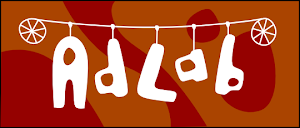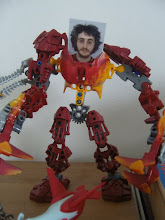I couldn't resist posting this little guy that I built in about 10 minutes today. A bit of creative procrastination away from the thesis.
It's almost a genuine robot as it consists of a sensor and an actuator, though an inability to manipulate it's environmet does exclude him from some definitions.
I'm not wiring up or programming him until the thesis is handed in!
Tuesday 30 November 2010
Thursday 11 November 2010
The Question in 'Philosophy Now'
I just found an article on The Question in the magazine Philosophy Now.
Here's a bit about the Lotus:
"Whilst the current haptic device, designed by humanoid technology engineer Adam Spiers, is a excellent step in the direction of delivering a similar theatrical experience to both blind and sighted participants, I have a sneaking suspicion that blind participants may have gained more from the experience than I."
This is an interesting point. On one hand the lack of light in the Question meant that sighted audience members were certainly deprvied of their primary navigational sense. On the other hand the familiarity of blind audience members with a lack of sight meant that the Lotus didn't always offer the same level of navigational benefits and encouragment as for sighted audience members.
The article was written by Sue Rolfe, who studied Philosophy under Martin Milligan. The plot of The Question was based on 'On Blindness' a book of letters between philosophers Bryan McGee and Martin Milligan, debating the nature of blindness with regard to one's experience and knowledge of the world.
The full Philosophy Now article is available here.
Here's a bit about the Lotus:
"Whilst the current haptic device, designed by humanoid technology engineer Adam Spiers, is a excellent step in the direction of delivering a similar theatrical experience to both blind and sighted participants, I have a sneaking suspicion that blind participants may have gained more from the experience than I."
This is an interesting point. On one hand the lack of light in the Question meant that sighted audience members were certainly deprvied of their primary navigational sense. On the other hand the familiarity of blind audience members with a lack of sight meant that the Lotus didn't always offer the same level of navigational benefits and encouragment as for sighted audience members.
The article was written by Sue Rolfe, who studied Philosophy under Martin Milligan. The plot of The Question was based on 'On Blindness' a book of letters between philosophers Bryan McGee and Martin Milligan, debating the nature of blindness with regard to one's experience and knowledge of the world.
The full Philosophy Now article is available here.
Haptic Lotus in the Guardian
The Question and the Haptic Lotus have been mentioned in today's Guardian newspaper G2 article titled:
'The player: videoless games can reveal skills we didn't know we had.
The Question and the iPhone game Papa Sangre can teach us things that video games can't'
In the article the journalist describes the Question (my collaboration with Extant) as her 'standout theatre experience of the year.' She also compares it with the audio only iPhone game Papa Sangre.
You can read the full article here.
'The player: videoless games can reveal skills we didn't know we had.
The Question and the iPhone game Papa Sangre can teach us things that video games can't'
In the article the journalist describes the Question (my collaboration with Extant) as her 'standout theatre experience of the year.' She also compares it with the audio only iPhone game Papa Sangre.
You can read the full article here.
Wednesday 10 November 2010
Surgical Tele-Haptics Job
I've been very poor at updating this blog recently, mainly on account of the rush to get my a complete draft of my PhD thesis to my supervisor before starting work as a research associate at Bristol robotics laboratory.
From now on I'll be working a great deal with haptic technologies. Already I've been plesently surprised by the accessibility of haptics, with the Novint falcon haptics interface costing only £200 and being supported by the Chai 3D open source C++ libraries (including dynamics engines for both rigid and deformable bodies). Using only these two elements I've already got a fully enabled haptics suite that I can start my research with. This is in stark constrast to the 3 months I spent at the start of my PhD writing drivers to get my very expensive robot to move at all.
Of course, I'm still working on the PhD...
 |
| The Novint Falcon haptic inteface |
This new project is looking at integrating the sense of touch into robot assisted larposcopic (keyhole) surgery. So a surgeon who is remotely controlling a medical robot will be able to feel what is inside the patient that they are working on, rather than just relying on the images provided by an endoscope for diagnosis and surgery.
 |
| Chai 3D screenshot |
Subscribe to:
Posts (Atom)




